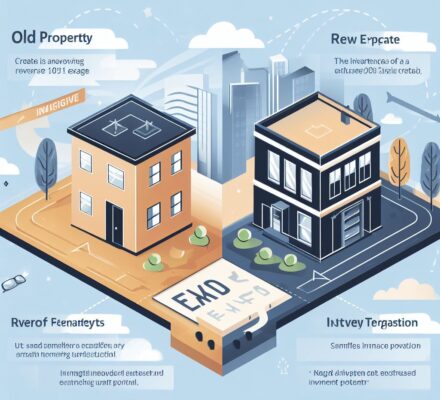Looking to make a smart move with your 1031 exchange exit strategy? Well, look no further! In this article, we’re going to reveal the three best replacement properties that will maximize your investment potential.
From residential rentals to commercial real estate and even vacation rentals, we’ve got you covered.
So, get ready to say goodbye to ordinary properties and hello to extraordinary profits.
It’s time to take your 1031 exchange to the next level!
Key Takeaways
- Replacement properties offer stable and consistent income, potential for property appreciation, and tax advantages and deductions.
- 1031 exchange exit strategy maximizes investment potential, allows for tax deferral on capital gains, and provides opportunities to upgrade to higher-value properties.
- Replacement properties provide diversification for investment portfolios and potential for long-term wealth accumulation.
- Commercial real estate, vacation rental properties, and residential rental properties are all viable options for replacement properties in a 1031 exchange exit strategy.
Residential Rental Properties
If you’re considering a 1031 exchange exit strategy, one of the best replacement property options to consider is residential rental properties. Investing in residential rental properties can offer numerous benefits and serve as a smart financial move.
First and foremost, residential rental properties provide a stable and consistent source of income. By renting out the property, you can generate monthly rental payments that can help cover the mortgage, taxes, and other expenses. This can lead to positive cash flow and potential long-term wealth accumulation.
Furthermore, residential rental properties have the potential for appreciation over time. As the property value increases, so does your equity, allowing you to build wealth and potentially sell the property for a profit in the future.
Additionally, residential rental properties offer tax advantages. Rental income is generally considered passive income, which can be subject to favorable tax treatment. Expenses related to the property, such as repairs, maintenance, and property management fees, may also be tax-deductible.
Lastly, residential rental properties provide diversification to your investment portfolio. By owning a mix of assets, such as stocks, bonds, and real estate, you can mitigate risk and potentially increase returns.
Commercial Real Estate
Consider commercial real estate as a potential replacement property option for your 1031 exchange exit strategy.
Commercial real estate refers to properties used for business purposes, such as office buildings, retail spaces, warehouses, and hotels.
Investing in commercial real estate can offer several advantages.
Firstly, it provides the opportunity for higher rental income compared to residential properties. Businesses are often willing to pay higher rents for prime locations, which can lead to greater cash flow.
Additionally, commercial leases are typically longer-term, providing a more stable income stream.
Secondly, commercial real estate can offer potential tax benefits. Depreciation deductions, cost segregation, and bonus depreciation are some of the tax advantages that can help reduce your tax liability.
Lastly, commercial real estate can provide diversification to your investment portfolio. By adding commercial properties to your portfolio, you can decrease the risk associated with relying solely on residential properties.
Vacation Rental Properties
When exploring replacement properties for your 1031 exchange exit strategy, you should explore vacation rental properties as a potential option to continue diversifying your investment portfolio. Vacation rental properties can offer a variety of benefits that make them an attractive choice for investors.
Firstly, vacation rentals provide the opportunity for consistent rental income. With the growing popularity of vacation rentals and the rise of platforms like Airbnb and VRBO, it has become easier than ever to attract guests and fill up your rental calendar. This steady stream of income can help offset the costs of property ownership and provide a reliable source of cash flow.
Secondly, vacation rental properties offer the potential for significant tax benefits. By classifying your property as a rental, you may be eligible for deductions such as mortgage interest, property taxes, insurance, and maintenance expenses. These deductions can help reduce your overall tax liability and increase your return on investment.
Lastly, vacation rentals allow for personal use. Unlike traditional rental properties, vacation rentals provide the opportunity for you to enjoy the property yourself during certain times of the year. This flexibility can make vacation rental properties a desirable option for those looking to combine investment with personal enjoyment.
Frequently Asked Questions
Can I Use the Proceeds From My 1031 Exchange to Purchase a Second Home for Personal Use?
Yes, you can use the proceeds from your 1031 exchange to purchase a second home for personal use. However, it is important to consult with a tax professional to understand any potential tax implications.
Are There Any Restrictions on the Location of Replacement Properties for a 1031 Exchange?
There are no restrictions on the location of replacement properties for a 1031 exchange. You have the freedom to choose any location that meets your investment goals and satisfies the requirements of the exchange.
Can I Exchange My Residential Rental Property for Multiple Replacement Properties?
Yes, you can exchange your residential rental property for multiple replacement properties in a 1031 exchange. This allows you to diversify your investment and potentially increase your income streams.
What Happens if I Cannot Find a Suitable Replacement Property Within the 45-Day Identification Period?
If you can’t find a suitable replacement property within 45 days, the IRS treats it as a failed exchange. You’ll have to pay capital gains taxes on your original property.
Are There Any Tax Implications if I Decide to Sell My Replacement Property Within a Few Years After Completing a 1031 Exchange?
If you decide to sell your replacement property within a few years after completing a 1031 exchange, there may be tax implications. It is important to consult with a tax professional to understand the specific implications in your situation.




